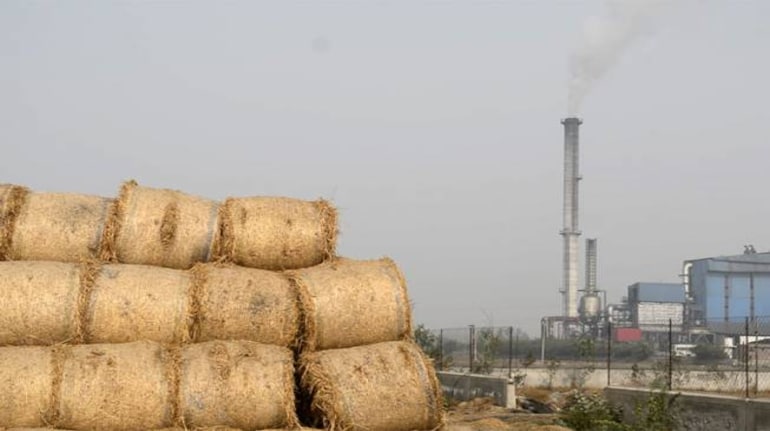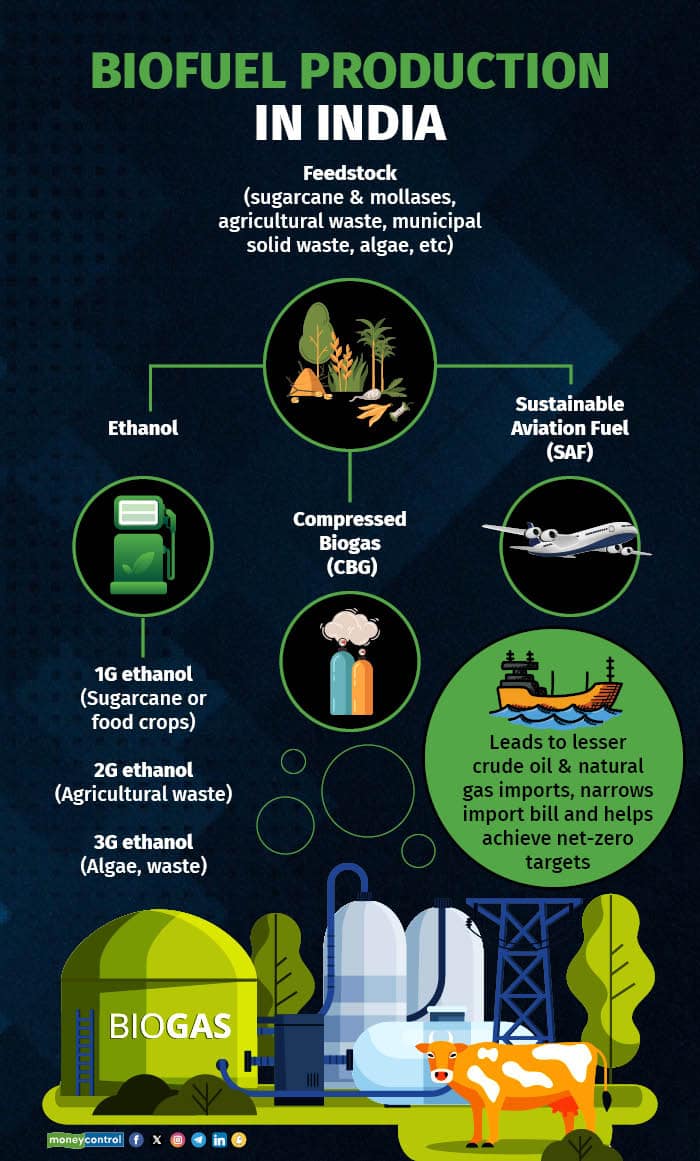
In India’s quest for energy transition and self-reliance, the government is pushing for growth in the biofuels sector as the country has an abundance of the required raw materials.
The nascent industry has recently picked up pace as India moves towards achieving its net-zero emissions target by 2070. The encouragement to the adoption of biofuels also comes on the back of the government’s aim to reduce the country’s reliance on oil and gas imports.
To begin with, biofuels are green fuels generated from organic and agricultural materials known as biomass.
Recent developments
In a recent push to the biofuels industry, Finance Minister Nirmala Sitharaman, while presenting the Interim Budget on February 1, announced financial assistance for the procurement of biomass aggregation machinery. She, however, has not disclosed the amount as of now.
In a similar move to promote adoption of biofuels, the government in November 2023 mandated blending of compressed biogas (CBG) in compressed natural gas (CNG) and piped natural gas (PNG) in a phased manner.
CBG blending will be voluntary for the upcoming financial year (FY25) and would be mandated from the following year. In FY26, 1 percent CBG blending in CNG and PNG would be made compulsory, followed by 3 percent, 4 percent and 5 percent in FY27, FY28 and FY29, respectively.
The Ministry of Petroleum and Natural Gas, which is leading the way in boosting the adoption of biofuels, has proactively taken steps to increase ethanol blending in petrol. India pledges to achieve 20 percent blending of ethanol in petrol by 2025, five years ahead of the earlier set targets, compared to the current target of 12 percent blending.

Government initiatives to support the industry
To promote the use of CBG in India, the government had launched a scheme in 2018 to set up 5,000 CBG plants across the country by 2023 under Sustainable Alternative Towards Affordable Transportation (SATAT) initiative. However, the government was unable to meet the target due to the disruptions caused by the COVID-19 pandemic.
ALSO READ:Exclusive: Not considering additional subsidies for biofuels, says Hardeep Singh Puri
With India geared up to achieve 20 percent ethanol blending in petrol, the Minister of Petroleum and Natural Gas, Hardeep Singh Puri, has said the government has plans to increase blending beyond 20 percent as well.
To promote the use of biofuels, the Indian government has offered several subsidies to the biofuels industry and 100 percent FDI to attract foreign attention to the sector.
Govt and private participation in the biofuel industry
Led by oil PSUs, the biofuels industry is witnessing participation from both government and private players. Oil Marketing Companies (OMCs) have taken the lead in ethanol blending in petrol.
Major government companies are also forming joint ventures with private players to set up biofuel plants. State-run GAIL (India) formed a joint venture with TruAlt Bioenergy, a Bengaluru-based biofuels company, to set up 10 CBG plants. TrueAlt Bioenergy told Moneycontrol that locations for the 10 plants have been finalised and will be commissioned by FY26.
Similarly, city gas distribution company IGL on February 7 signed MoUs with two technical partners at India Energy Week 2024 for setting up 19 CBG plants. Many energy and oil companies including Reliance Industries Limited (RIL), Indian Oil Corporation Limited and Bharat Petroleum Corporation Limited have pledged to set up CBG plants.
RIL targets to establish 100 CBG plants in the next five years, consuming 5.5 million tonnes of agri-residue and organic waste.
Impact of biofuels on Indian economy
Since India is dependent on imports for over 85 percent of its crude oil requirements and around 50 percent of its natural gas needs, it becomes important for the country to look at ways to reduce its reliance on imports.
Reports by the International Energy Agency (IEA), point out that energy demand and consumption in India is going to be one of the highest in the world. In such a scenario, it becomes critical for India to either increase domestic production or rely on alternate fuels such as biofuels.
Reduced imports of oil and gas also help in narrowing the country’s import bill. Puri had recently said that blending ethanol in petrol has resulted in savings of Rs 24,300 crore of foreign exchange in 2022-23.
ALSO READ: India in talks with Germany for technology collaborations in biofuel sector, says IBA’s Gaurav Kedia
Other than helping in achieving net-zero targets and reducing reliance on imports, biofuels also tackle the issue of stubble burning, by using the stubble itself to create biofuel, rather than having to burn it. Stubble burning, observed mostly in the northern Indian states, leads to severe health and environmental risks. The government has been long looking for ways to contain the practice which results in severe air pollution in many cities.
Particularly in Punjab and Haryana, farmers burn paddy stalks in winter to clear their fields for the next crop. This results in air pollution, affecting Delhi and areas around the city.
Challenges faced by the industry
Despite the push given by the government, the biofuels sector faces the major challenge of round-the-clock feedstock availability. Proper infrastructure for collection, storage and transportation of feedstock remains the major issue in the sector. Identifying the challenge, the government has now announced measures to address the issue.
In India, ethanol is majorly produced by sugarcane and its products such as B molasses. This raises the question of food security in India. However, the government is now shifting focus towards biofuel production through other crops including corn, rice, barley, and agricultural waste and municipal waste.
“Price volatility is also a concern as prices are driven by seasonality and as an industry player, you would want to have predictability in prices,” said Suhas Baxi, Co-founder & CEO, BioFuelCircle.
Another challenge is the off-take of the bio-energy produced. Vijay Nirani, Founder & Managing Director, TruAlt Bioenergy, said, “One challenge is the collection of raw material and the other is offtake of the gas produced. The government has now allowed injecting the compressed biogas into the CNG mother line”.
Meanwhile, to facilitate the adoption of biofuels, India had launched the Global Biofuel Alliance on September 9 under its G20 Presidency.
Nineteen countries including Brazil, the US, Canada and Italy, and 12 international organisations have joined the GBA, which is expected to support the development of biofuels by offering capacity-building exercises across the value chain, providing technical support for national programmes and promoting the sharing of policy lessons.
Discover the latest Business News, Sensex, and Nifty updates. Obtain Personal Finance insights, tax queries, and expert opinions on Moneycontrol or download the Moneycontrol App to stay updated!
Find the best of Al News in one place, specially curated for you every weekend.
Stay on top of the latest tech trends and biggest startup news.